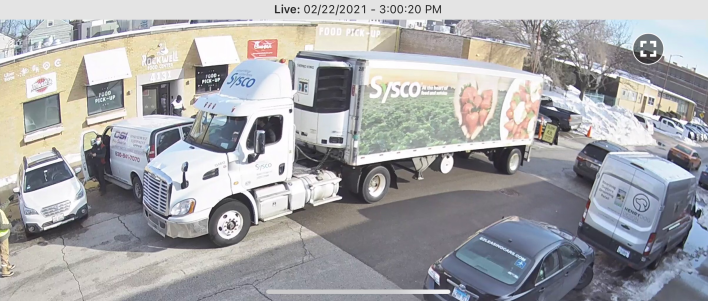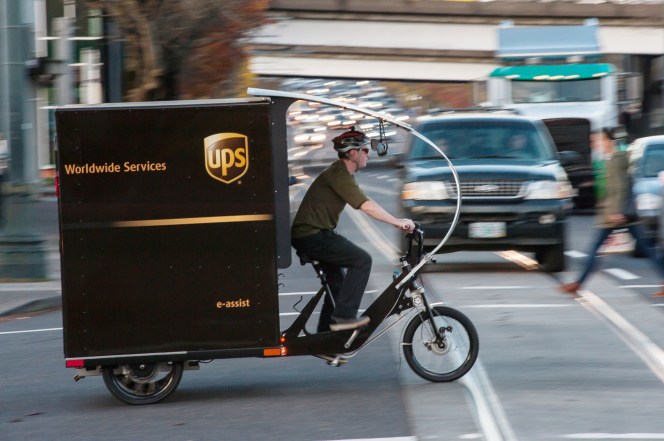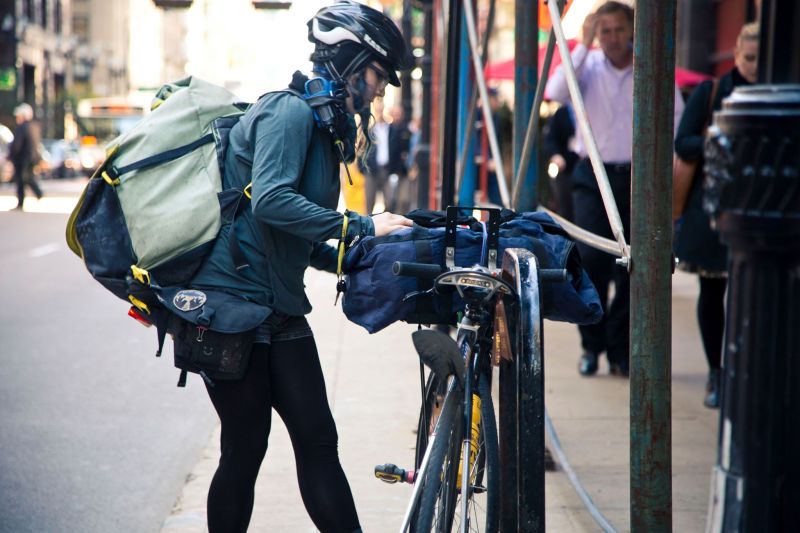North Center neighbors are fed up with car traffic generated by CloudKitchens, a commercial kitchen for delivery-only restaurants, located at 4131 N. Rockwell Ave. According to a Block Club report by Alex V. Hernandez, residents have complained about Rockwell being blocked by food delivery drivers who double park on Rockwell and drivers of large trucks using Rockwell for unloading. One neighbor reported a 16-wheeler blocking the road for close to an hour. As the truck was being unloaded, delivery drivers were parked in front and to the side of the truck, making the residential road impassable.
Police records show that between October 26 and January 26 there were 13 reports of parking violations, seven calls to the police regarding disturbances, and three crashes, according to an earlier Block Club article. One resident was quoted as saying she no longer allows her children to play in the front yard and that her son was almost hit riding his bike in the family’s driveway. Many neighbors who have attended meetings between CloudKitchens and local alderman Matt Martin (47th) have reported instances of drivers executing three point turns or U-turns on Rockwell.

While one could argue that CloudKitchens needs to move to an area designed to handle the type of vehicular traffic it creates, the situation begs for a closer look. This scenario is one of the many failures of our car-centric transportation system.
I doubt I am changing anyone’s minds on days when I yell from my bike saddle, “Cars are such an inefficient way to get around a dense city!” but it’s the truth. Most car trips in the Chicagoland are only transporting one person and many car trips are under 5 miles, according to the Chicago Metropolitan Agency for Planning. Five miles is a reasonable cycling distance but we currently don’t have the type of safe, low-stress infrastructure that would make a wide range of people consider biking as a viable form of transportation.
I found this Uber ad a few years ago and it beautifully points out the absurdity of traveling in a large metal box for the majority of trips in cities. (Ironically, it also shows why any kind of car-based transportation, including Uber, is generally a bad way to get around cities.)
I certainly sympathize with the residents of North Center who are being impacted by the increased and arguably inappropriate vehicle traffic in their neighborhood. But relocating CloudKitchens elsewhere in the city would only relocate the problem of air pollution, traffic noise, clogged streets, and unsafe conditions for people walking and biking.
Most restaurants deliver within a 5-10 mile radius of their location. These are distances that should be safe and efficient for a delivery driver to traverse by bike for the sake of climate resilience, traffic congestion, public health, and economic health. With the advances of cargo bikes in recent years, including high-capacity electric electric cycles, cargo bikes are more than capable of being used for food and goods delivery within dense urban cities.
The biggest and initial barrier to widespread transportation biking is lack of protected bike lanes, the infrastructure most preferred by would-be cyclists. Along with a protected bike lane network that facilitates cross-town or cross-neighborhood trips, we also need traffic-calmed residential streets to facilitate food delivery by bike, everyday grocery shopping, and so many of the other trips that are being defaulted to the car due to a built environment that favors the automobile over all other modes. Ridership follows investment.
I recently told my alderwoman Maria Hadden that I was frustrated that a trip a mile from my home involved a driver unnecessarily speeding past me and dangerously running a red light. Coincidentally I was going out to pick up pizza from a local restaurant because I didn’t see the point in a delivery driver hopping in a car just to deliver a pizza one mile to me.

Just as delivery personnel don't necessarily need a car to transport food, the same goes for many everyday trips that Chicagoans are taking in cars and the thousands of package deliveries happening by vehicle. The city of Chicago officially legalizing the use of low-speed electric cargo cycles in bike lanes last October was a step in the right direction.
Mass investment in safe bike infrastructure is a crucial next step in converting many of our unnecessary car trips into bike trips. The city could use some of itsCOVID relief funds for quick-build walking, transit, and biking projects that address the changes in transportation needs as a result of the pandemic. While this might not immediately solve the CloudKitchens problem, it would be a step towards reducing car dependence which will benefit us all.
Read Block Club's coverage of the CloudKitchens issue here and here.





